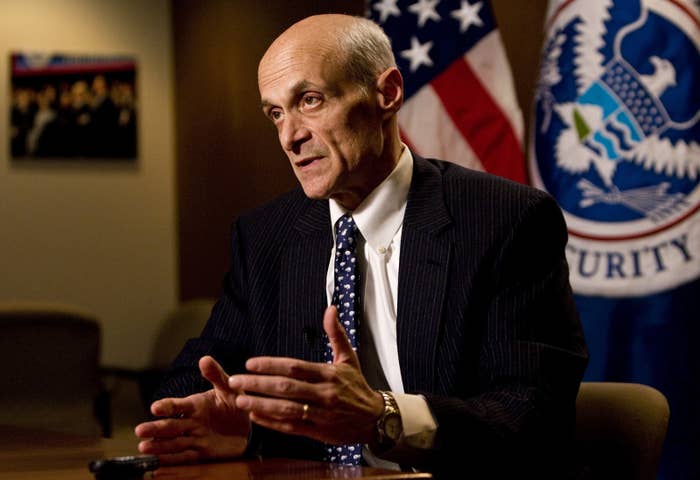
Though Marc Andreessen was the keynote speaker, Tim Cook's name was on everyone's lips at a Stanford University conference on cybersecurity today — including former Secretary of Homeland Security Michael Chertoff.
Cook published an open letter to customers this morning explaining Apple's decision not to comply with a court order demanding that the company give the FBI access to the iPhone that belonged to the San Bernardino shooter. And in the subsequent fallout, the cybersecurity experts who were scheduled to discuss the clash between national security and personal privacy were suddenly faced with a very real-world example of the issue at hand.
One of those panelists was Chertoff. In his remarks, Chertoff said he is largely against the creation of backdoors in consumer tech products that would give the government access to user data. But he also argued that there's a difference between unlocking an individual device (which he said Apple has done before) and creating a vulnerability that would be present in multiple devices.
"If someone said, 'Here's a laptop that Vladimir Putin ordered; would you like us to put something in it that's going to allow a backdoor?' I'd say, 'Have at it!' It's one particular individual, and there's a good reason to do it," Chertoff said.
But the case of Apple versus the FBI, Chertoff argued, is tricky, because the process that would give the FBI access to the phone in question could open up a class of iPhones to hacking and other vulnerabilities via what Chertoff called a "phantom operating system."
"We're not talking about something that would defeat encryption in general, we're not even something that as I understand it that would defeat encryption in phones produced after a certain date," he said. (This latter point is not correct, according to Apple.) "So in that sense it's a more limited than a generalized backdoor."
Chertoff also argued that if Apple did not cooperate with law enforcement, it could have a negative impact on the company's bottom line, and on business as usual in Silicon Valley. While the tech industry sees individual privacy as the top priority, he argued that Americans "in the rest of the country" are more fearful about security than they are concerned with privacy. If Apple and others are seen as being more concerned with their own business interest than the lives of regular Americans, tech companies risk losing those consumers, Chertoff said.
"It's a mistake to believe that there's a high degree of trust in Silicon Valley," he said. "There's a view that American business is out for American business, and working people are getting screwed."
As tensions on the panel made clear, the issue of security versus privacy is heated. Because of that, a factor that is compounded by the fact that it's an election year, Chertoff said we're unlikely to see federal legislation on the issue of encryption anytime soon.
"Even the bill they did last year on cybersecurity, which is pretty plain vanilla, took a couple years," he told BuzzFeed News. "This is way complicated." Chertoff went on to say that the debate will likely make its way "higher up in the court system."
